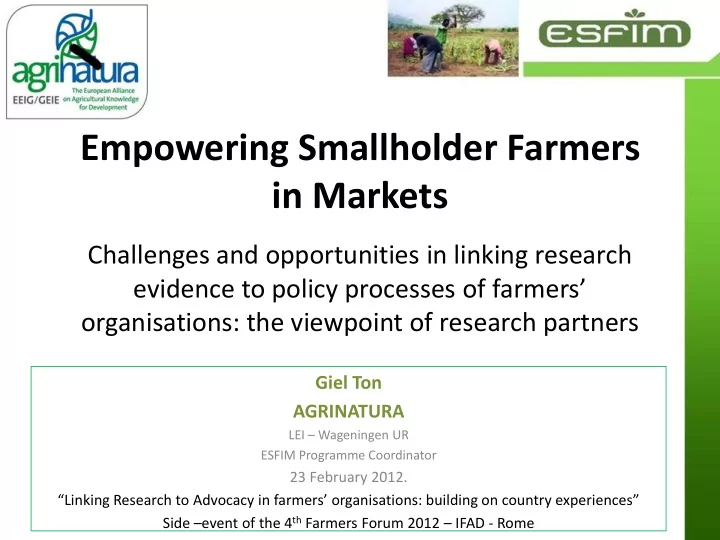

Empowering Smallholder Farmers in Markets Challenges and opportunities in linking research evidence to policy processes of farmers’ organisations: the viewpoint of research partners Giel Ton AGRINATURA LEI – Wageningen UR ESFIM Programme Coordinator 23 February 2012. “Linking Research to Advocacy in farmers’ organisations: building on country experiences” Side – event of the 4 th Farmers Forum 2012 – IFAD - Rome
Who are we? • Initiated by IFAP in 2007 – (2008-2010) Financially supported by IFAD, AGRICORD/AGRITERRA and CTA • Continued with ten NATIONAL FARMERS’ ORGANISATIONS – (2010-2012) Financially supported by IFAD and two Dutch Ministries • Managed by AGRINATURA (LEI WAGENINGEN UR) – Platform of 35 European universities and research organisations working in agricultural research, education and capacity strengthening for development. – The ESFIM-consortium: Wageningen UR, CIRAD and NRI
Collaborative Research in 10 countries
Challenge • Building a research-advocacy interface – Research support to national farmers’ organisations that strengthen their capacities to formulate feasible, evidence-based propositions to get a more focussed advocacy agenda on smallholder market access
Activities A. COLLABORATIVE RESEARCH (90%) • Research priorities defined by NFO: – Participatory workshops: address critical constraints for smallholders’ access to markets – Local research on key issues contracted by NFO – Backstopping by AGRINATURA (LEI, CIRAD, NRI) B . COMPARATIVE RESEARCH (10%) • Overarching desk studies and policy briefs: – Risk Insurance Models – Innovative Financial Models – Incentive Structures in Collective Marketing – Market Information Systems
• ESFIM Philippines – FFF : Commodity Exchange • ESFIM Kenya – KENFAP : Public Input Programme • ESFIM Peru – JNC : Taxation and government procurement • ESFIM Madagascar – CPM : Rural service provisioning • ESFIM Uganda – UNFFE : NAADS rural advisory system • ESFIM Benin – FUPRO : Maize sector policy and value chain • ESFIM Costa Rica – CMC : Food sovereignty policies • ESFIM Malawi – NASFAM : Seed supply & market information • ESFIM Bolivia – CIOEC : Collective marketing & legal recognition • ESFIM Uruguay – CAF : National innovation policy
RESEARCH COMMUNITY FARMER ORGANISATIONS • • Research Centres tend to focus on NFOs are interested in findings not peer-reviewed research (focus = so much in research methods methods) not on how findings • NFOs contract might be applied in development researchers/consultants, when practice linked to their short-term • Researchers are more interested in (advocacy) priorities mid/long-term studies • NFOs often lack capacity to access • Funding generally for pre-defined existing research evidence research issues: little flexibility to • NFO do not prioritise own budget adapt for external researchers • High staff-fee rates There are enough good intentions (policies) to link research to farmer organisations’ needs. However, limited experiences with working mechanisms (practices) that effectively bridge the gap between these different ‘cultures’.
Lessons learned • Workshops versus fact-finding: the mix varies per NFO but in some countries it tends too much towards workshops mainly due to ‘inherent’ factors: – budget constraints – legitimacy needs • Often a preference for ‘internal’ NFO staff as consultants instead of contracting established researchers – Causing delays in reporting deadlines (many other tasks) – (Sometimes) poor quality of writing-up their excellent analysis – Constrains the building of a national research-advocacy interface
ESFIM: theory and practice CPM CAF CIOEC CMC FUPRO FF-AP FFF JNC KENFAP NASFAM UNFFE MORE INTERNAL STAFF MORE EXTERNAL RESEARCHERS TOO CENTRALLY DEFINED TOO CONSULTATIVE Source: comparative analysis of ESFIM process by involved AGRINATURA researchers, October 2011
Lessons learned • Country specific advocacy strategies: – Countries where the NFO worked through a wider platform of farmer organisations, were generally more focused on policies and advocacy for supportive policies to farmers – Countries where NFOs worked more with economic FOs, the focus tended to be more on institutional arrangements that create market access – Need for personal champions but they need to represent the views of the members and have proposals that are based on evidence • Opportunity to feed country experiences into regional networks: – The programme creates interesting case-studies of research-for- advocacy by NFOs that can be used to feed discussions in the regional platforms (‘how - to’ and ‘what’).
Lessons learned • Need for an institutional arrangement (governance) that provides a balance: – Separate funding lines for each: for research assignments and for priority setting and advocacy within the NFO – Requiring an advocacy strategy in advance of research, and flexibility and room for adaptation according to contextual policy dynamics. – Sufficient time frame to have a process that builds confidence (both researchers and NFOs) in the use of evidence to refine advocacy agendas
Next steps (mid 2012) • Building on the intervention logic behind ESFIM, we defined key assumption to be validated: – that evidence is needed for effective advocacy – that our activities have helped to reinforce advocacy capacities • An NFO self-evaluation tool developed and being applied, complemented with panel interviews, to assess jointly the advocacy strength of partner NFOs
Phase 3 (projected): ESFIM Country Research Support Funds Grant facility for research assignments on issues prioritized by the NFO Budget for NFOs to define priority issues and for advocacy Quality check on proposals by AGRINATURA and a national research institute NFO feeds experiences into regional farmer networks Follow-up and backstopping of research assignments by AGRINATURA
WWW.ESFIM.ORG
Discussion • Learn of other FO experiences of research evidence to advocacy for policy, institutional, or organisational change (15 mins) – Examples should focus what processes or mechanism worked well • Looking to the future, develop specific recommendations for strengthening the link with research, to provide evidence for NFO’s advocacy, and for scaling up ( 30 mins ) – Possible role and actions by: national and regional FOs, researchers, governments and funding partners
Recommend
More recommend